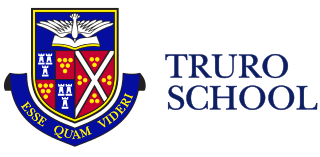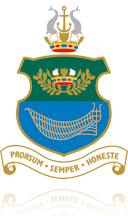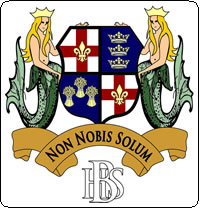
Truro School is a coeducational independent day and boarding school located in the city of Truro, Cornwall, England. It is the largest coeducational independent school in Cornwall with over 1050 pupils from pre-prep to sixth form. It is a member school of the Headmasters' and Headmistresses' Conference.

Devonport High School for Boys is a grammar school and academy, for boys aged 11 to 18, in Plymouth, Devon, England. It has around 1,135 pupils. Its catchment area includes southwest Devon and southeast Cornwall as well as Plymouth. Pupils are accepted on the basis of academic aptitude.

Benenden School is an independent boarding school for girls in Kent, England, in Hemsted Park at Benenden, between Cranbrook and Tenterden. Benenden has a boarding population of over 550 girls aged 11 to 18, as well as a limited number of day student spaces.

Pretoria High School for Girls, is a full-government, fee-charging, English-medium high school for girls located in Hatfield, Pretoria in the Gauteng province of South Africa. It is the sister school to Pretoria Boys High School.

Devonport High School for Girls is a selective girls' state grammar school with academy status in Plymouth, England.

Colyton Grammar School is a co-educational grammar school located in the village of Colyford in East Devon, England that caters for pupils aged 11 to 18. The school has been classified by Ofsted as 'Outstanding' in three successive reports. As of 2023 it was ranked by The Sunday Times as the ninth best state school in the country, and the second best in the South West. Founded by local merchants in 1546, the school is situated on an 18 acre site near the Devon coast.
St Boniface's Catholic College is a secondary school for boys, under the direction and trustees of the Roman Catholic Community in the Plymouth area in the South West of England. Founded in 1856 as an independent boarding and day school for "young Catholic gentlemen" in the West Country, it is now a comprehensive school. The College is named for St Boniface who was born in Crediton, Devon and is the patron saint of Germany. The school has a list of distinguished former pupils including Air Chief Marshal Sir John Gingell GBE KCB KCVO, the writer and intelligence agent Alexander Wilson, and Sir Julian Priestley KCMG, Secretary General of the European Parliament from 1997 – 2007.
Ipswich High School is a co-educational independent school at Woolverstone Hall near Ipswich, England. Formerly an exclusive school for girls, it was converted to co-education in 2018 following acquisition by the China-oriented investment banker London & Oxford Group.

Howell's School is an independent day school for girls in Llandaff, a district in northern Cardiff, Wales. It consists of a nursery, infants, junior, senior school and a sixth form. The sixth form became coeducational in September 2005 and was renamed Howell's Co-ed College.

Ysgol Gyfun Gymraeg Glantaf is a Welsh-medium coeducational secondary school in Llandaff North, a district in the north of Cardiff, Wales; it is the largest of its kind in the country. Of the three Welsh-medium secondary schools serving Cardiff, it was the first to be established; the others are Ysgol Gyfun Gymraeg Plasmawr and Ysgol Gyfun Gymraeg Bro Edern. Although all students speak Welsh and normally have received Welsh-language primary education, 68% come from homes where Welsh is not the first language.

Boston High School, also known as Boston High School for Girls, is a selective grammar school and sixth form college for girls aged 11 to 18 in Boston, Lincolnshire, England. The school's sixth form has been coeducational since 1992.

Chessington School is a co-educational secondary school with a sports centre, in the Royal Borough of Kingston upon Thames, Greater London. The current building was opened in September 2009.
Churston Ferrers Grammar School is a selective coeducational Grammar School with Academy status, situated in the village of Galmpton in Torbay, South Devon, England. It is also a specialist Humanities College. Year 7 annual intake is approximately 130 pupils.
Notre Dame RC School is a Roman Catholic school for girls in Derriford, Plymouth, England. Its sister school is St Boniface's Catholic College.

Truro High School for Girls is an independent day and boarding school for girls in Truro, Cornwall. The school consists of a girls-only prep school, senior school and sixth form. It is a member of the Girls' Schools Association.
Frances Bardsley Academy for Girls is a non-denominational girls school and sixth form centre in the London Borough of Havering, England. The school educates girls between the ages of 11 and 18.

Hyde Park Junior School (HPJS), founded in 1904, is a coeducational junior school located on Hyde Park Road, close to Mutley Plain in Plymouth, Devon, England. Catering for around 360 boys and girls between the ages of 7 and 11, it is housed in the same building as its partner school, Hyde Park Infants. The school's catchment area extends across part of the suburbs of Plymouth including Mutley and Mannamead.

UTC Plymouth is a university technical college (UTC) that opened in the Devonport area of Plymouth, Devon, England in September 2013.
Marine Academy Plymouth is a mixed all-through school located in the King's Tamerton area of Plymouth in the English county of Devon. The school includes a nursery, primary, secondary and sixth form section.

Plymouth Athenaeum, located in Plymouth, England, is a society dedicated to the promotion of learning in the fields of science, technology, literature and art.















